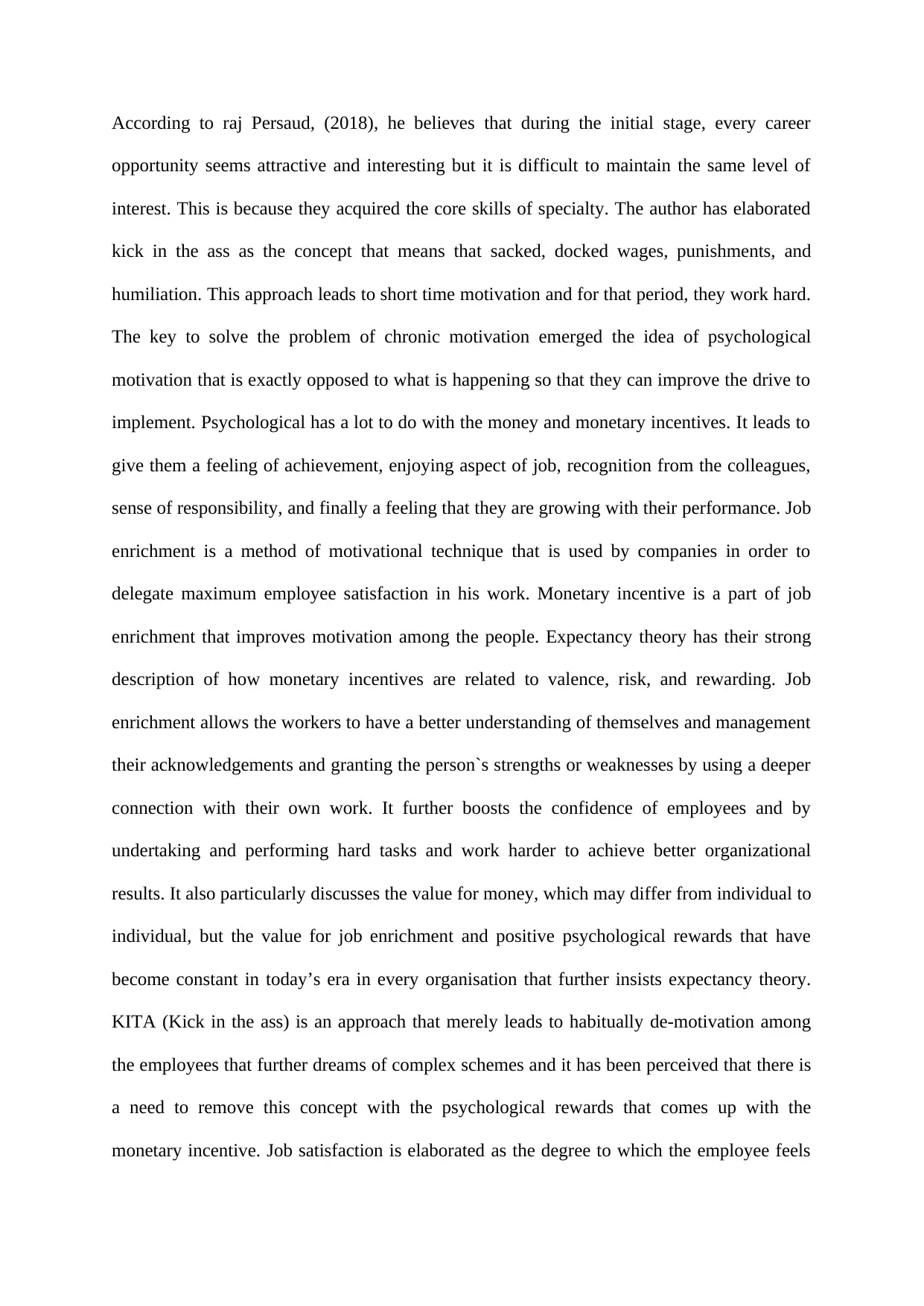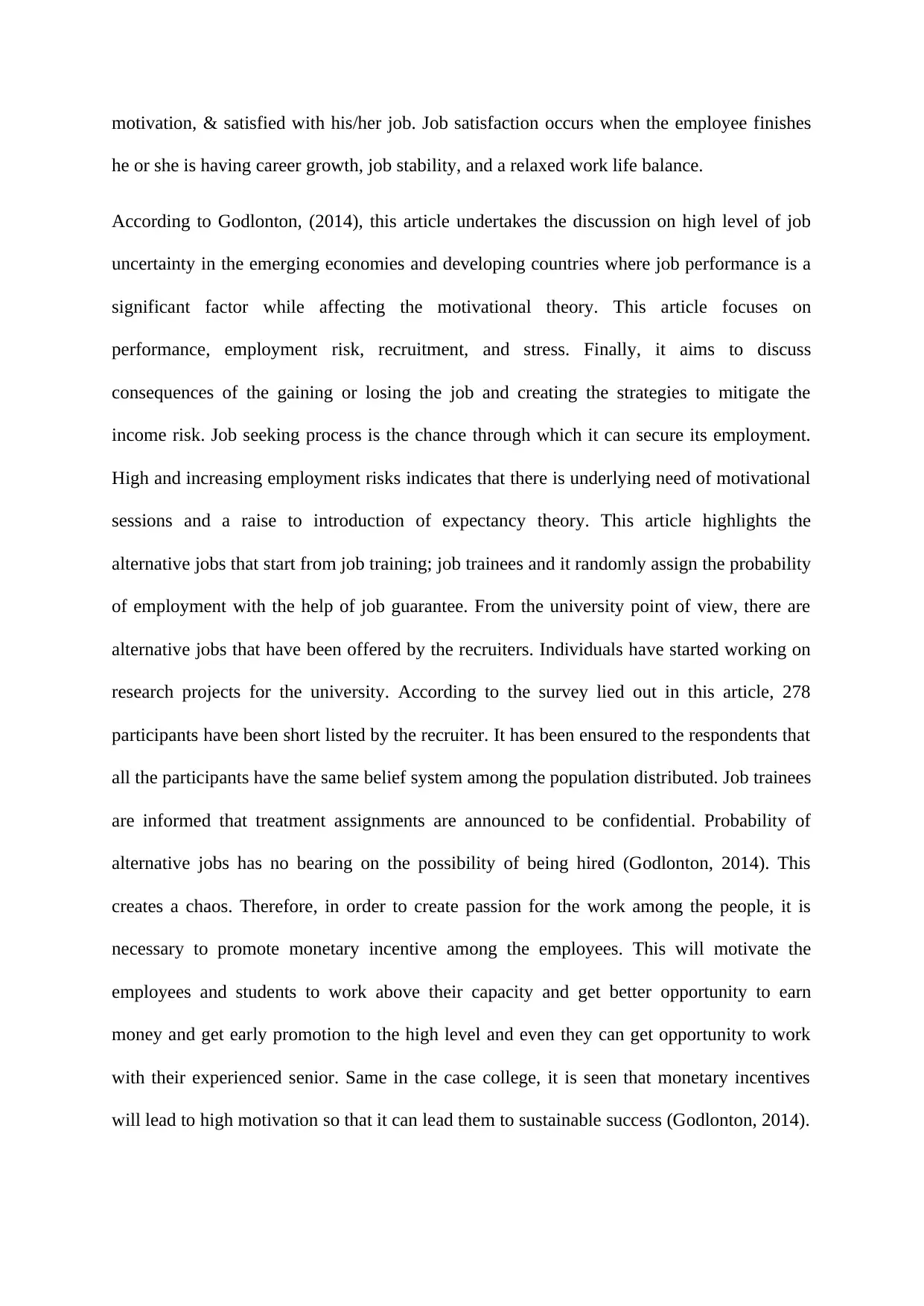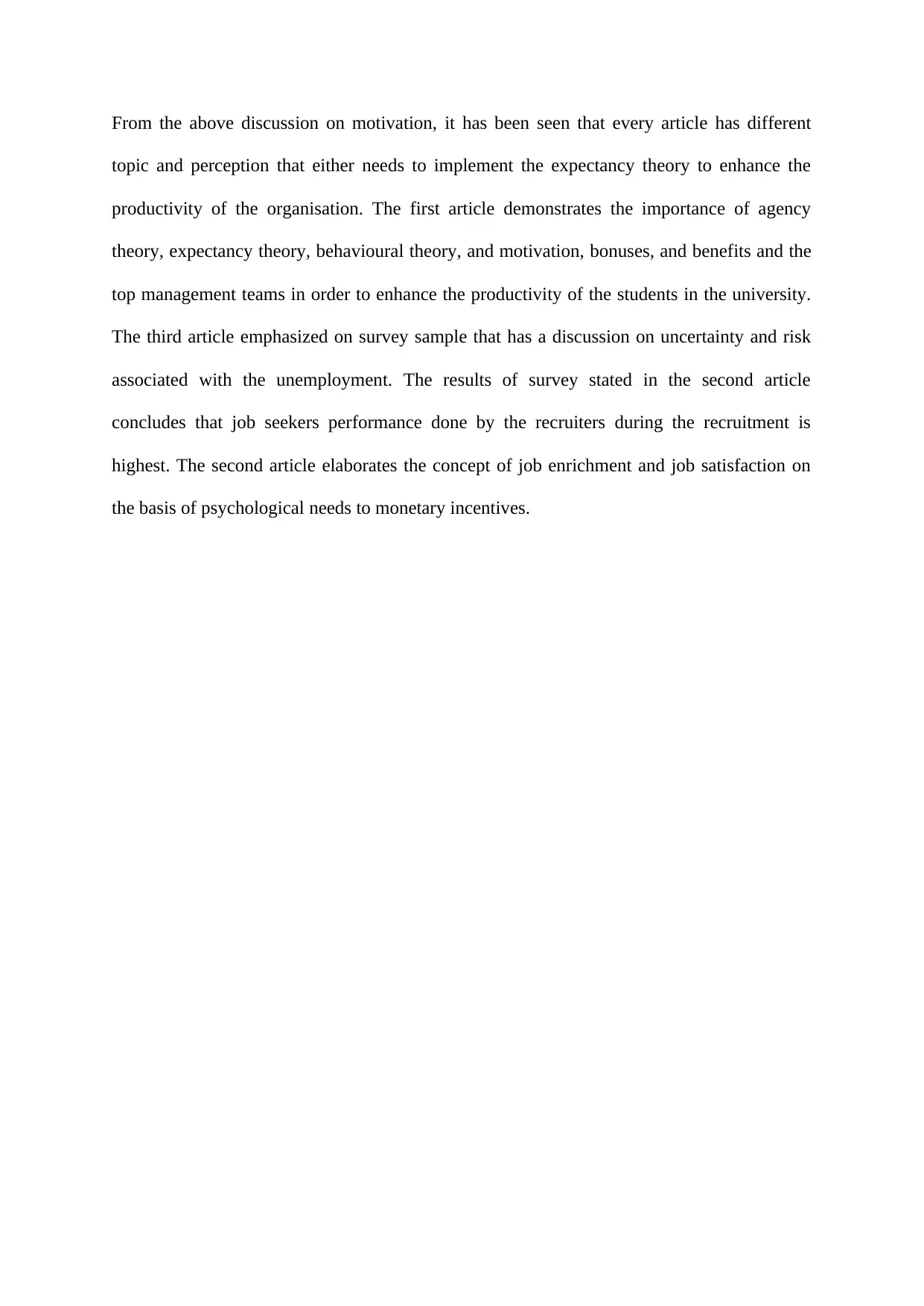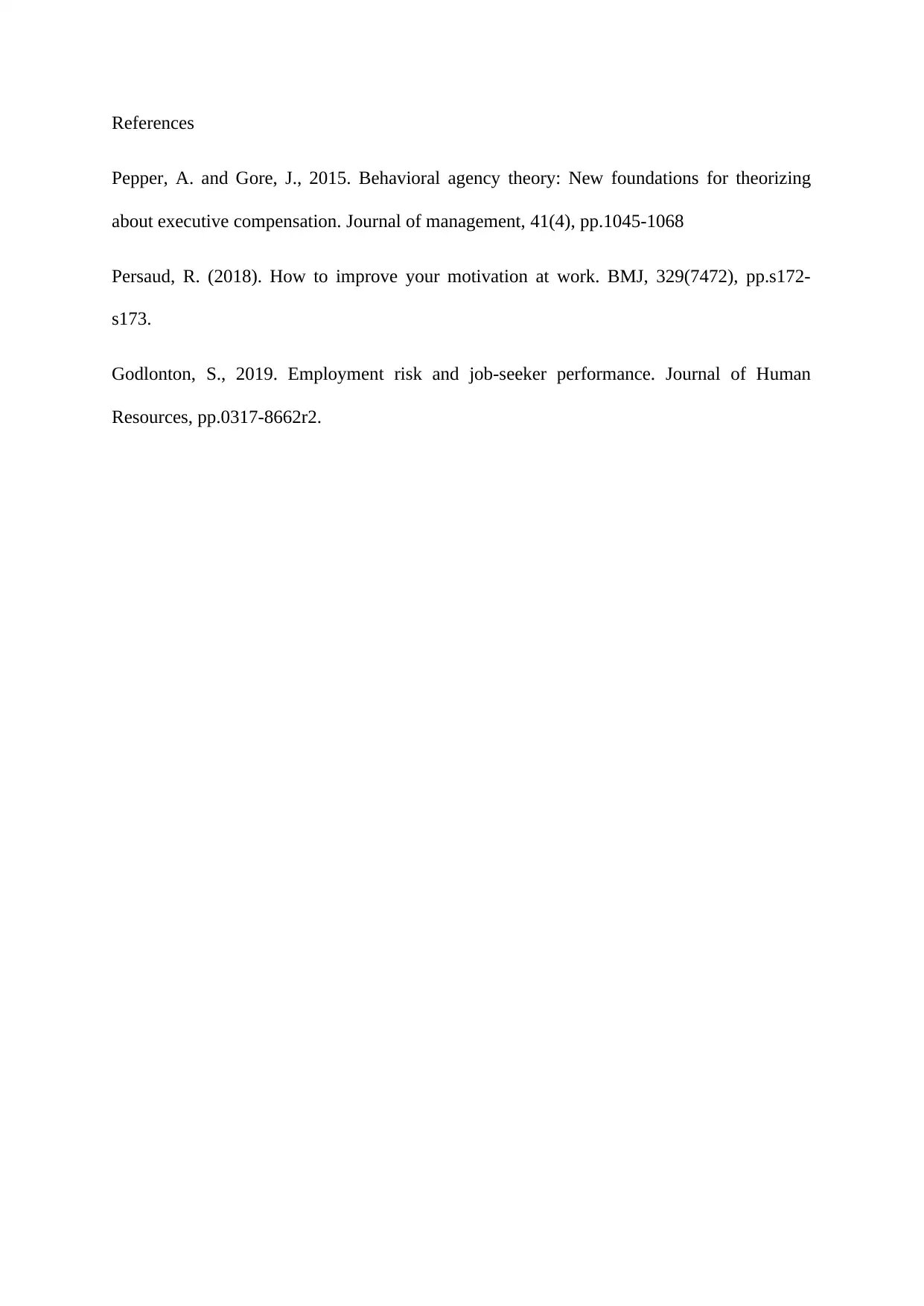Management Essay: Motivation, Expectancy Theory, and Performance
VerifiedAdded on 2023/01/20
|8
|1730
|67
Essay
AI Summary
This essay delves into the concepts of motivation and expectancy theory within an organisational context, drawing from three key articles. It explores how motivation, encompassing both intrinsic and extrinsic factors, influences employee performance and productivity. The essay examines the behavioural agency theory, highlighting the alignment of shareholder interests with executive performance. It also discusses how psychological rewards, such as recognition and job enrichment, can enhance job satisfaction and drive motivation, contrasting these approaches with the 'kick in the ass' method. Furthermore, the essay analyses the impact of employment risk on job-seeker performance and the role of monetary incentives in various scenarios, including university settings. The discussion emphasizes the importance of aligning organisational objectives, providing appropriate rewards, and fostering a positive work environment to boost employee engagement and achieve sustainable success.

ORGANISATIONAL BEHAVIOUR
AND MANAGEMENT
AND MANAGEMENT
Paraphrase This Document
Need a fresh take? Get an instant paraphrase of this document with our AI Paraphraser

Introduction
This essay brings out a discussion on motivation and its theory of expectancy. Motivation
contributes to positivity in the organisation by inculcating in the role of the organisation.
Motivation is the power to influence people in a positive way so that it can induce the
employees to work in a positive way. It is important to know that employee`s performance is
on the basis of individual factors such as skills, personality, experience, abilities and
knowledge. It is considered that effort, performance and the motivation are linked to the
person`s motivation. This essay is an in-depth discussion and review of three articles. The
first article is on the behavioural agency theory (Pepper, and Gore, 2015). The second article
elaborates that how motivation can be improved at the workplace to improve the productivity.
It discusses about the psychological motivation that should not include the humiliation, and
punishment. This article argues that appreciation can lead to job satisfaction and
psychological rewards are more effective for job enrichment and job satisfaction. It is
observed that psychological rewards will result into job satisfaction and job enrichment. The
third article describes employment risk and performance of job seekers (Pepper, and Gore,
2015).
According to Pepper, and Gore, (2015), the theory of motivation is used in many
investigations that reflects the motivational force affect the monetary incentives. This
behavioural change motivated through monetary benefits is expectancy theory. It is
essentially concerned with more extrinsic factors rather than total motivation or intrinsic. As
far as the performance of universities is concerned, monetary incentive can be in terms
scholarships, rewarding a huge concession in the future fees of the next level (Pepper, and
Gore, 2015). Expectancy theory is also known as temporal motivation theory that assumes
This essay brings out a discussion on motivation and its theory of expectancy. Motivation
contributes to positivity in the organisation by inculcating in the role of the organisation.
Motivation is the power to influence people in a positive way so that it can induce the
employees to work in a positive way. It is important to know that employee`s performance is
on the basis of individual factors such as skills, personality, experience, abilities and
knowledge. It is considered that effort, performance and the motivation are linked to the
person`s motivation. This essay is an in-depth discussion and review of three articles. The
first article is on the behavioural agency theory (Pepper, and Gore, 2015). The second article
elaborates that how motivation can be improved at the workplace to improve the productivity.
It discusses about the psychological motivation that should not include the humiliation, and
punishment. This article argues that appreciation can lead to job satisfaction and
psychological rewards are more effective for job enrichment and job satisfaction. It is
observed that psychological rewards will result into job satisfaction and job enrichment. The
third article describes employment risk and performance of job seekers (Pepper, and Gore,
2015).
According to Pepper, and Gore, (2015), the theory of motivation is used in many
investigations that reflects the motivational force affect the monetary incentives. This
behavioural change motivated through monetary benefits is expectancy theory. It is
essentially concerned with more extrinsic factors rather than total motivation or intrinsic. As
far as the performance of universities is concerned, monetary incentive can be in terms
scholarships, rewarding a huge concession in the future fees of the next level (Pepper, and
Gore, 2015). Expectancy theory is also known as temporal motivation theory that assumes

modification in motivation in terms of expectancy and valence, which is shaken by delays,
uncertainty, and risks. It is related with trust in the capabilities of the person, align how tasks
with the person`s set of skills, create the organisational objectives and set them to achieve. It
is to establish the correlation between rewarding and correlation (Pepper, and Gore, 2015).
The author relates compensation closely with the sum of incentives and rewards. This
encouragement is prior to performance and then encouraging the agents in a way. While
paying the bonus or other rewards, it is seen that a certain level of compensation is based on
high tendency and frequency of a person to gain the recognition again even in the influence
of averse risks (Pepper, and Gore, 2015). Sometimes small probabilities are under-
recognition become major weighing and greater probabilities of affecting the inflection point.
Mainly, there are three important components of the expectancy theory such as
instrumentality, valence, and the expectancy that defines situation such as performance-
outcome (performance is more than outcome) and effort-performance (p is more than o). The
organisations often use it to align the promises complied with the organisation` management
and policies (Pepper, and Gore, 2015). This theory can be used to measure the performance
of the students in the academics at the universities. This loss or gain is related to individual
differences. The individual endowment compensation related is comprised of actual current
compensation that is enhanced to the extent of further future incentives with a reasonable
degree of certainty (Pepper, and Gore, 2015). Before making the present compensation plan,
a university sees the past bonus payments. For example- the student is scoring well from the
very beginning accomplished with academic excellence as well as co-curriculum. It is great
possibility that the same student will receive the reward for the next time too. Therefore, in
order to motivate the students of the university, monetary compensation should be introduced
in every field and it should be equal on the part of the university as no field or area is inferior
(Pepper, and Gore, 2015).
uncertainty, and risks. It is related with trust in the capabilities of the person, align how tasks
with the person`s set of skills, create the organisational objectives and set them to achieve. It
is to establish the correlation between rewarding and correlation (Pepper, and Gore, 2015).
The author relates compensation closely with the sum of incentives and rewards. This
encouragement is prior to performance and then encouraging the agents in a way. While
paying the bonus or other rewards, it is seen that a certain level of compensation is based on
high tendency and frequency of a person to gain the recognition again even in the influence
of averse risks (Pepper, and Gore, 2015). Sometimes small probabilities are under-
recognition become major weighing and greater probabilities of affecting the inflection point.
Mainly, there are three important components of the expectancy theory such as
instrumentality, valence, and the expectancy that defines situation such as performance-
outcome (performance is more than outcome) and effort-performance (p is more than o). The
organisations often use it to align the promises complied with the organisation` management
and policies (Pepper, and Gore, 2015). This theory can be used to measure the performance
of the students in the academics at the universities. This loss or gain is related to individual
differences. The individual endowment compensation related is comprised of actual current
compensation that is enhanced to the extent of further future incentives with a reasonable
degree of certainty (Pepper, and Gore, 2015). Before making the present compensation plan,
a university sees the past bonus payments. For example- the student is scoring well from the
very beginning accomplished with academic excellence as well as co-curriculum. It is great
possibility that the same student will receive the reward for the next time too. Therefore, in
order to motivate the students of the university, monetary compensation should be introduced
in every field and it should be equal on the part of the university as no field or area is inferior
(Pepper, and Gore, 2015).
⊘ This is a preview!⊘
Do you want full access?
Subscribe today to unlock all pages.

Trusted by 1+ million students worldwide

According to raj Persaud, (2018), he believes that during the initial stage, every career
opportunity seems attractive and interesting but it is difficult to maintain the same level of
interest. This is because they acquired the core skills of specialty. The author has elaborated
kick in the ass as the concept that means that sacked, docked wages, punishments, and
humiliation. This approach leads to short time motivation and for that period, they work hard.
The key to solve the problem of chronic motivation emerged the idea of psychological
motivation that is exactly opposed to what is happening so that they can improve the drive to
implement. Psychological has a lot to do with the money and monetary incentives. It leads to
give them a feeling of achievement, enjoying aspect of job, recognition from the colleagues,
sense of responsibility, and finally a feeling that they are growing with their performance. Job
enrichment is a method of motivational technique that is used by companies in order to
delegate maximum employee satisfaction in his work. Monetary incentive is a part of job
enrichment that improves motivation among the people. Expectancy theory has their strong
description of how monetary incentives are related to valence, risk, and rewarding. Job
enrichment allows the workers to have a better understanding of themselves and management
their acknowledgements and granting the person`s strengths or weaknesses by using a deeper
connection with their own work. It further boosts the confidence of employees and by
undertaking and performing hard tasks and work harder to achieve better organizational
results. It also particularly discusses the value for money, which may differ from individual to
individual, but the value for job enrichment and positive psychological rewards that have
become constant in today’s era in every organisation that further insists expectancy theory.
KITA (Kick in the ass) is an approach that merely leads to habitually de-motivation among
the employees that further dreams of complex schemes and it has been perceived that there is
a need to remove this concept with the psychological rewards that comes up with the
monetary incentive. Job satisfaction is elaborated as the degree to which the employee feels
opportunity seems attractive and interesting but it is difficult to maintain the same level of
interest. This is because they acquired the core skills of specialty. The author has elaborated
kick in the ass as the concept that means that sacked, docked wages, punishments, and
humiliation. This approach leads to short time motivation and for that period, they work hard.
The key to solve the problem of chronic motivation emerged the idea of psychological
motivation that is exactly opposed to what is happening so that they can improve the drive to
implement. Psychological has a lot to do with the money and monetary incentives. It leads to
give them a feeling of achievement, enjoying aspect of job, recognition from the colleagues,
sense of responsibility, and finally a feeling that they are growing with their performance. Job
enrichment is a method of motivational technique that is used by companies in order to
delegate maximum employee satisfaction in his work. Monetary incentive is a part of job
enrichment that improves motivation among the people. Expectancy theory has their strong
description of how monetary incentives are related to valence, risk, and rewarding. Job
enrichment allows the workers to have a better understanding of themselves and management
their acknowledgements and granting the person`s strengths or weaknesses by using a deeper
connection with their own work. It further boosts the confidence of employees and by
undertaking and performing hard tasks and work harder to achieve better organizational
results. It also particularly discusses the value for money, which may differ from individual to
individual, but the value for job enrichment and positive psychological rewards that have
become constant in today’s era in every organisation that further insists expectancy theory.
KITA (Kick in the ass) is an approach that merely leads to habitually de-motivation among
the employees that further dreams of complex schemes and it has been perceived that there is
a need to remove this concept with the psychological rewards that comes up with the
monetary incentive. Job satisfaction is elaborated as the degree to which the employee feels
Paraphrase This Document
Need a fresh take? Get an instant paraphrase of this document with our AI Paraphraser

motivation, & satisfied with his/her job. Job satisfaction occurs when the employee finishes
he or she is having career growth, job stability, and a relaxed work life balance.
According to Godlonton, (2014), this article undertakes the discussion on high level of job
uncertainty in the emerging economies and developing countries where job performance is a
significant factor while affecting the motivational theory. This article focuses on
performance, employment risk, recruitment, and stress. Finally, it aims to discuss
consequences of the gaining or losing the job and creating the strategies to mitigate the
income risk. Job seeking process is the chance through which it can secure its employment.
High and increasing employment risks indicates that there is underlying need of motivational
sessions and a raise to introduction of expectancy theory. This article highlights the
alternative jobs that start from job training; job trainees and it randomly assign the probability
of employment with the help of job guarantee. From the university point of view, there are
alternative jobs that have been offered by the recruiters. Individuals have started working on
research projects for the university. According to the survey lied out in this article, 278
participants have been short listed by the recruiter. It has been ensured to the respondents that
all the participants have the same belief system among the population distributed. Job trainees
are informed that treatment assignments are announced to be confidential. Probability of
alternative jobs has no bearing on the possibility of being hired (Godlonton, 2014). This
creates a chaos. Therefore, in order to create passion for the work among the people, it is
necessary to promote monetary incentive among the employees. This will motivate the
employees and students to work above their capacity and get better opportunity to earn
money and get early promotion to the high level and even they can get opportunity to work
with their experienced senior. Same in the case college, it is seen that monetary incentives
will lead to high motivation so that it can lead them to sustainable success (Godlonton, 2014).
he or she is having career growth, job stability, and a relaxed work life balance.
According to Godlonton, (2014), this article undertakes the discussion on high level of job
uncertainty in the emerging economies and developing countries where job performance is a
significant factor while affecting the motivational theory. This article focuses on
performance, employment risk, recruitment, and stress. Finally, it aims to discuss
consequences of the gaining or losing the job and creating the strategies to mitigate the
income risk. Job seeking process is the chance through which it can secure its employment.
High and increasing employment risks indicates that there is underlying need of motivational
sessions and a raise to introduction of expectancy theory. This article highlights the
alternative jobs that start from job training; job trainees and it randomly assign the probability
of employment with the help of job guarantee. From the university point of view, there are
alternative jobs that have been offered by the recruiters. Individuals have started working on
research projects for the university. According to the survey lied out in this article, 278
participants have been short listed by the recruiter. It has been ensured to the respondents that
all the participants have the same belief system among the population distributed. Job trainees
are informed that treatment assignments are announced to be confidential. Probability of
alternative jobs has no bearing on the possibility of being hired (Godlonton, 2014). This
creates a chaos. Therefore, in order to create passion for the work among the people, it is
necessary to promote monetary incentive among the employees. This will motivate the
employees and students to work above their capacity and get better opportunity to earn
money and get early promotion to the high level and even they can get opportunity to work
with their experienced senior. Same in the case college, it is seen that monetary incentives
will lead to high motivation so that it can lead them to sustainable success (Godlonton, 2014).

From the above discussion on motivation, it has been seen that every article has different
topic and perception that either needs to implement the expectancy theory to enhance the
productivity of the organisation. The first article demonstrates the importance of agency
theory, expectancy theory, behavioural theory, and motivation, bonuses, and benefits and the
top management teams in order to enhance the productivity of the students in the university.
The third article emphasized on survey sample that has a discussion on uncertainty and risk
associated with the unemployment. The results of survey stated in the second article
concludes that job seekers performance done by the recruiters during the recruitment is
highest. The second article elaborates the concept of job enrichment and job satisfaction on
the basis of psychological needs to monetary incentives.
topic and perception that either needs to implement the expectancy theory to enhance the
productivity of the organisation. The first article demonstrates the importance of agency
theory, expectancy theory, behavioural theory, and motivation, bonuses, and benefits and the
top management teams in order to enhance the productivity of the students in the university.
The third article emphasized on survey sample that has a discussion on uncertainty and risk
associated with the unemployment. The results of survey stated in the second article
concludes that job seekers performance done by the recruiters during the recruitment is
highest. The second article elaborates the concept of job enrichment and job satisfaction on
the basis of psychological needs to monetary incentives.
⊘ This is a preview!⊘
Do you want full access?
Subscribe today to unlock all pages.

Trusted by 1+ million students worldwide

References
Pepper, A. and Gore, J., 2015. Behavioral agency theory: New foundations for theorizing
about executive compensation. Journal of management, 41(4), pp.1045-1068
Persaud, R. (2018). How to improve your motivation at work. BMJ, 329(7472), pp.s172-
s173.
Godlonton, S., 2019. Employment risk and job-seeker performance. Journal of Human
Resources, pp.0317-8662r2.
Pepper, A. and Gore, J., 2015. Behavioral agency theory: New foundations for theorizing
about executive compensation. Journal of management, 41(4), pp.1045-1068
Persaud, R. (2018). How to improve your motivation at work. BMJ, 329(7472), pp.s172-
s173.
Godlonton, S., 2019. Employment risk and job-seeker performance. Journal of Human
Resources, pp.0317-8662r2.
Paraphrase This Document
Need a fresh take? Get an instant paraphrase of this document with our AI Paraphraser

1 out of 8
Related Documents
Your All-in-One AI-Powered Toolkit for Academic Success.
+13062052269
info@desklib.com
Available 24*7 on WhatsApp / Email
![[object Object]](/_next/static/media/star-bottom.7253800d.svg)
Unlock your academic potential
Copyright © 2020–2025 A2Z Services. All Rights Reserved. Developed and managed by ZUCOL.





